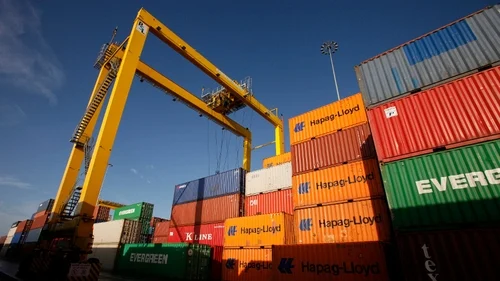U.S. exporters retaliation could soon become a major headline as international tensions rise over recent trade disputes. With new tariffs and trade measures being discussed in multiple global forums, industries like chemicals, plastics, and bourbon are potentially in the crosshairs of retaliatory actions. For U.S. manufacturers and producers, this is more than just economic theory—it’s a growing concern that could shake up exports, supply chains, and jobs.
In this article, we’ll explore why retaliation is brewing, who may be targeted, and how this could impact the American economy.
Why Is Retaliation on the Table?
Trade wars aren’t new. But every time one side raises tariffs, the other side often responds. That’s what retaliation means in the global trade world—when a country hits back with its own tariffs or restrictions. The idea is simple: to pressure the other side to back down or change its trade policies.
Recently, the U.S. has taken steps to increase tariffs or impose trade restrictions on various goods coming from other countries, particularly China and parts of the European Union. These moves are part of efforts to protect domestic industries and address unfair trade practices. However, affected countries are now considering retaliatory actions—and this time, they may target some very specific sectors of the U.S. economy.
Which Industries Are Most at Risk?

The chemical, plastics, and bourbon industries are all high-value export sectors for the U.S. and have become likely targets in a possible retaliation strategy.
1. U.S. Chemical Industry
The chemical industry is one of America’s largest export categories, representing over $150 billion annually in shipments. Products like polymers, industrial gases, and specialty chemicals are essential inputs for manufacturing all over the world.
Retaliation targeting U.S. chemicals could:
- Reduce export volumes significantly.
- Drive up costs for international buyers.
- Force U.S. firms to cut production or lay off workers.
This sector is particularly vulnerable because it’s deeply embedded in global supply chains. A 10% tariff on chemicals by a foreign government could translate into a major loss in price competitiveness.
2. Plastics Industry
U.S. plastics exports account for billions of dollars annually. These include items like:
- Raw plastic resins
- Sheets and films
- Plastic parts for electronics, medical devices, and cars
A retaliation strategy that includes plastics could disrupt many downstream industries, from packaging to automotive to consumer goods. Many foreign governments have already hinted that plastics are “on the list” for future tariffs if tensions escalate.
3. Bourbon and American Whiskey
This isn’t the first time bourbon has been used as a trade pawn. In previous trade disputes, especially with the EU, American whiskey was directly targeted with retaliatory tariffs. The goal was symbolic and economic—target products that represent “Americana” and also impact politically sensitive regions like Kentucky and Tennessee.
If bourbon faces tariffs again:
- U.S. distillers could lose market share to Irish or Scottish competitors.
- Small craft distilleries may find export markets unprofitable.
- Retail prices in foreign markets could spike, leading to a drop in sales.
Who’s Considering Retaliation?
Several countries and trade blocs are evaluating their options:
- European Union (EU): The EU has previously retaliated with tariffs on American steel, bourbon, and Harley-Davidson motorcycles. With tensions rising again, similar moves could return.
- China: As part of the ongoing U.S.-China trade disputes, China has the economic firepower and the political motivation to slap tariffs on any U.S. product it sees as sensitive or strategic.
- Canada and Mexico: Though part of USMCA, they have previously retaliated when U.S. policies were seen as unfair or aggressive.
Retaliation isn’t just about economics—it’s also about politics. Countries often choose products that are made in key electoral states, hoping to create internal pressure on U.S. policymakers.
How Big Could the Impact Be?
The potential impact of U.S. exporters retaliation is substantial. Here’s a breakdown:
| Industry | Annual U.S. Export Value | Potential Tariff Impact |
|---|---|---|
| Chemicals | $150 billion | Loss of up to $20 billion in exports |
| Plastics | $70 billion | $8-10 billion at risk |
| Bourbon | $1.7 billion | 30-40% decline in EU sales if tariffs imposed |
Real-World Reactions from Industry Leaders
Industry organizations are already sounding the alarm.
Chris Jahn, CEO of the American Chemistry Council, recently stated:
“Retaliatory tariffs would be devastating for U.S. chemical exports. We urge policymakers to avoid actions that would provoke such a response.”
Similarly, the Distilled Spirits Council warned in a statement that new tariffs could stall the recovery of American whiskey exports after the pandemic and previous trade tensions.
What Can Exporters Do?

If you’re part of the affected industries, it’s important to act now:
Diversify Markets
Look beyond traditional markets. Southeast Asia, Africa, and Latin America may offer alternatives to Europe or China.
Lobby Through Trade Associations
Industry voices matter. Participating in lobbying efforts through trade organizations can influence policy decisions.
Reassess Pricing Strategies
Build in flexibility to account for sudden tariffs or restrictions. Dynamic pricing could help maintain competitiveness.
Build Local Partnerships
For bourbon distillers, forming partnerships with foreign distributors or bottlers could help reduce the impact of border taxes.
What Does This Mean for the Average Consumer?
Even if you’re not a business owner or exporter, you may still feel the effects:
- Higher prices on imported goods or American products sold overseas.
- Reduced job opportunities in manufacturing-heavy states.
- Potential delays in global supply chains due to increased friction.
Can This Be Avoided?
It’s possible, but it will require diplomatic finesse.
Negotiations are ongoing between trade officials. Some experts believe compromises can still be reached, especially if all sides realize the cost of escalation.
However, if talks fail and retaliatory tariffs hit full swing, the ripple effects will be widespread and long-lasting.
Final Thoughts
The threat of U.S. exporters retaliation isn’t just political posturing—it has the potential to impact jobs, prices, and entire industries. For now, it remains a possibility, but not a certainty. Still, businesses would be wise to prepare for the worst while hoping for a diplomatic solution.
Trade policy might feel distant, but its effects are deeply personal—especially when your job, your business, or your favorite bourbon is on the line.
Read Next – U.S. Trade War Threats Put American Businesses at Risk






